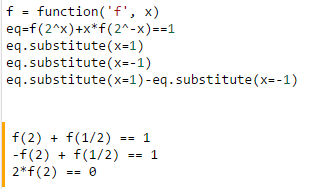Think!
Given that f ( 2 x ) + x f ( 2 − x ) = 1 , find the value of f ( 2 ) .
This section requires Javascript.
You are seeing this because something didn't load right. We suggest you, (a) try
refreshing the page, (b) enabling javascript if it is disabled on your browser and,
finally, (c)
loading the
non-javascript version of this page
. We're sorry about the hassle.
5 solutions
I used a similar approach:
f ( 2 x ) + x ∗ f ( 2 − x ) = 1 = f ( 2 − x ) + ( − x ) f ( 2 x )
⇒ f ( 2 x ) − ( − x ) f ( 2 x ) + x f ( 2 − x ) − f ( 2 − x ) = 0
⇒ f ( 2 x ) ( 1 + x ) + f ( 2 − x ) ( 1 − x ) = 0
Plugging in x = 1 gets us: f ( 2 ) ( 1 + 1 ) + f ( 2 1 ) ( 1 − 1 ) = f ( 2 ) ∗ 2 + 0 = 0
⇒ 2 ∗ f ( 2 ) = 0 ⇒ f ( 2 ) = 0
(dunno, why I can't post this anymore as a solution)
sAme Way!!!
Did the same
f ( 2 x ) + x f ( 2 − x ) = 1 p u t t i n g − x i n p l a c e o f x f ( 2 − x ) − x f ( 2 x ) = 1 s o l v i n g t h e s e t w o e q u a t i o n f ( 2 x ) = 1 + x 2 1 − x h e n c e , p u t t i n g x = 1 f ( 2 ) = 0
I like this because it gives you an explicit definition for the function. Let 2 x = y and rearrange: x = lo g 2 y , you can express the function as f ( y ) = 1 + lo g 2 y 1 − lo g 2 y
x = 1, f(2) + f(1/2) = 1
x = -1, f(1/2) - f(2) = 1
f(2) + f(1/2) = f(1/2) - f(2)
2f(2) = 0
f(2) = 0
I couldn't do this with Python's sympy but someone on quora.com just showed me how to do it with Sage.

Let x = 1, then f(2) + f(1/2) = 1. (1)
Let x = log_2(1/2), in this case f((1/2)) - f(2) = 1 (2)
From (1) and (2) f(1/2) = 1. Thus, f(2) = 0.
Sub x = 1 , we get f ( 2 ) + f ( 2 1 ) = 1 .
Sub x = − 1 , we get f ( 2 1 ) − f ( 2 ) = 1 .
First equation - Second equation:
2 f ( 2 ) = 0 ⟹ f ( 2 ) = 0 .